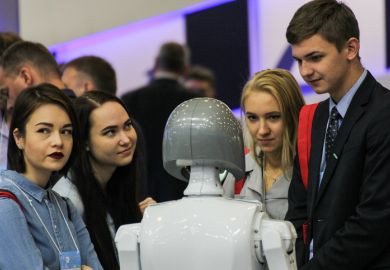Academics have criticised a UK university’s plan to stop them claiming authorship of their own lectures.
With several British universities preparing to use recorded lectures to replace teaching missed by students during the walkouts by university staff over pensions reform, lecturers at the University of Nottingham have raised concerns about a new policy that requires them to sign away their intellectual property.
As part of the policy to record most lectures from 2018-19, the university is asking staff to give it an “exclusive, transferable, sub-licensable and irrevocable licence to all rights in the lecturer’s performance in [a recorded] lecture”.
As part of the “copyright, intellectual property, performance rights and consent” agreement, staff would agree that they “may not be credited as the creator or author of the lecture” and would “not…object to the way in which the lecture recording is edited, altered or used by the university”.
As such, “all rights in materials created by the lecturer as part of the normal course of their employment…belong to the university”, the policy says.
In light of “strike-related issues”, the policy had caused consternation, said Philip Moriarty, professor of physics at Nottingham, who went on to say that it was “intensely irritating that the university feels that it can use the material we produce and edit [and] retransmit it [to] exploit [it] commercially without so much as a by-your-leave”.
Antonio Padilla, another professor of physics, said that the proposed policy could represent a “complete abuse of university power”.
“The most alarming aspect is their ability to edit and use the material at will,” added Professor Padilla, who said that he had been informed that the local University and College Union branch had sought assurances from the vice-chancellor, Shearer West, about the proposed policy.
“Prior to the strike, I probably wouldn't have thought much of this, trusting the university to act appropriately,” he said, but he explained that “trust has been eroded” during the industrial action around proposed cuts to the Universities Superannuation Scheme.
Professor Padilla added that, for him, “lectures are a personal interaction between me and my class”.
“To share outside of that domain seems like a violation of our privacy, unless we both consent to the specific form in which it will be shared,” he said, adding that staff “should have the choice not to consent to specific scenarios we are uncomfortable with”.
A Nottingham spokesman said that “lecture capture is popular with students, who have campaigned for it over a number of years”, and explained that the university was “consulting staff on its use, with a clear ‘opt-out’ policy”. Under the new policy, all lectures would be recorded and made available online unless there was a specific, sound reason not to video.
“It is part of a range of options to help students catch up if disrupted by strikes, but we are clear that it is no replacement for the real thing,” he said.
The spokesman added that the intellectual property clauses were "standard practice" but that the university would "keep the position under constant review and waive the employer’s statutory right to IP created in the course of employment in favour of staff wherever appropriate".




